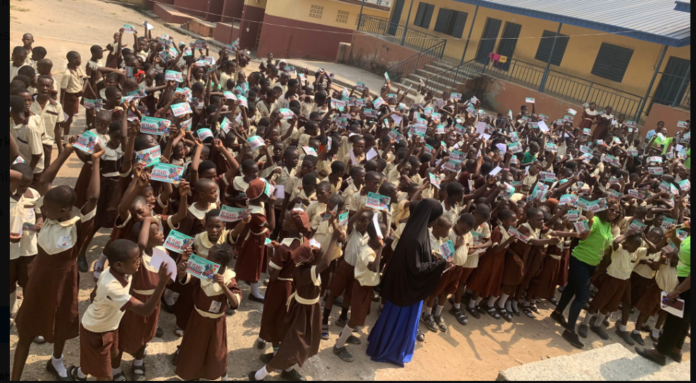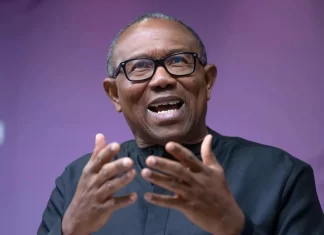UNICEF, Editors Guild champion support for children
With about five million children affected by Conflict in Nigeria being in need of humanitarian support, UNICEF and the Nigerian Guild of Editors (NGE) have appealed to media practitioners to use their pen to protect children.
They made the appeal at a high powered symposium organised by the NGE and the Diamond Award for Media Excellence (DAME) in partnership with UNICEF.
The symposium with the theme: “Reinforcing the Role of Media in Mainstreaming Child Rights,” was aimed to engage media practitioners, government officials, the private sector, and child rights advocates in vital discussions on child welfare in Nigeria.
In her presentation titled ‘The State Of Nigeria’s Children: Summary Of The 2024 Situational Analysis Of Children and Adolescents in Nigeria,’ UNICEF Country Representative in Nigeria, Cristian Munduate, who underscored the severity of the situation many children face in the country, similarly, revealed that 2.1 million Nigerian children have not received any vaccines, leaving them vulnerable to preventable diseases.
According to her, nearly 10 million primary school-age children are not in school, adding that poverty and insecurity are major barriers.
Furthermore, Munduate highlighted that 67 per cent of Nigerian children face various forms of deprivation including poor health and lack of education.
However, UNICEF country representative in Nigeria, who noted that this trend can be reversed, called on the Media to place children at the top of national agenda.
As a very powerful sector of society, Munduate said the media can play a powerful role in the country. “You can help us keep children alive and put their issues at the top of national agenda.
“You can inform society about the situation of children, but at the same time raising the awareness and making everybody understand they are accountable for children because each adult in the country has a role to play.
“Of course, we spoke a lot today about government’s accountability, whether it is at the federal, state or local government level.
“We also spoke about the accountability of communities, parents, families, religious and local leaders, but you (Media) is an agent of information, awareness and behaviour change; your words are powerful.
“The way you can reach all these actors that I mentioned plays a role because you go massive on how to protect children, help children live, thrive, develop, and how to have practices to prevent children from falling into risky situations.”
While calling for media accountability and a very strong partnership, the UNICEF representative in Nigeria, said the Media should influence policy changes as well as maintain pressure on stakeholders.
“Childhood is short. We must act now to secure a better future for our children,” Munduate stressed.
The symposium stressed the role of the Media in holding the government accountable and amplifying the voices of vulnerable children.
Speaking in a similar vein, the President of the NGE, Mr. Eze Anaba and other stakeholders similarly urged media practitioners in Nigeria to embrace solution journalism.
In his speech titled, “Reinforcing the Role of Media in Mainstreaming Child Rights,” Anaba said: “As journalists, editors, and media practitioners, we wield a unique power: the power of storytelling.
“The narratives we create can inspire, mobilise, and drive change.
“We must ensure that our children remain ahead in all we do with the objective of making our country and the world a better place for them.
“I urge us to channel this power toward a cause that demands our collective attention, the rights and well-being of Nigerian children.”
Describing the situation as a national emergency, Anaba called for collective commitment from journalists, policymakers, and health professionals to prioritise child rights.
Child rights should not be relegated to the margins of our news cycles, but should take center stage where they belong.”
Beyond highlighting challenges, Anaba stressed the importance of celebrating successes, such as the implementation of child-friendly policies, community-driven solutions and young changemakers making an impact.
Speaking on the plight of Nigerian children, Tunde Onakoya, founder of Chess in Slums Africa, said: “The Nigerian child is an interesting paradox. On one hand, they represent hope and potential.
“However, potential means nothing if it’s not realised. The Nigerian child faces staggering odds just to survive.”
Onakoya further explained that Nigeria’s future workforce is at risk.
“If we have 20 million children out of school with no skills or education, how will they participate in the future economy? Without education, they will become liabilities rather than assets.”
Onakoya pointed out that the world would classify such children as refugees and illegal immigrants.
While calling on governments, parents and guardians to invest more in the development of Nigerian children, he urged the Media to discharge its story-telling responsibility.
According to Onakoya the Media has power to change the narrative; we need to think about the future.”














